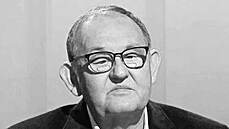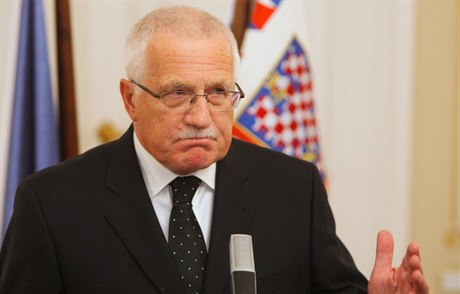President Václav Klaus has always been a politician possessing distinct yet — until recently — not extreme opinions. Therefore, we can expect that he will occasionally come up with a surprisingly provocative statement. After a relatively long pause, Klaus wrote a remarkable essay titled “A small Czech Hilsneriad, or another case of the dictatorship of political correctness” that appeared in the daily Právo.
In it, he defends Ladislav Bátora, who was set to become — allegedly upon the Castle’s recommendation — the first deputy of the Minister of Education, Josef Dobeš (Public Affairs, VV). But seeing that the media and politicians branded Bátora an extremist, he will most likely be just his aide. In Klaus’ opinion, this is unjust since that which is “politically correct” is throughout the world and in our country, too, allegedly defined by a group of people who have attained an incredibly strong position in the media.
It is somewhat peculiar that the right-wing Klaus assumed this position in the leftist Právo, after he published in the daily his “memoirs from journeys.”
Multi-colored past
But let’s get back to Bátora. Klaus is of the opinion that he is “a profoundly conservative, right-wing person, participating in various public events against things he does not agree with.” Yet, Bátora’s political past is too multi-colored to fit this description. In the 2006 elections, he was the election leader of the crypto-fascist National Party (NS), which openly denied the holocaust of the Roma and advocated “emigration of the Gypsies currently living in the territory of the Czech Republic to India.”
In 2007, the NS’s youth organization even announced a march through Prague’s Jewish Town to mark the anniversary of the anti-Jewish pogrom in the Third Reich known as of Kristallnacht, the Night of Broken Glass. Bátora claims, however, that the NS only became xenophobic in the campaign preceding the European elections in 2009, when he no longer had anything common with it the party. Yet this is not true, and if the people at the Castle wanted to they could easily verify it.
By the way, the “authentic right-wing man” Bátora, a graduate of several universities, launched his political career in the “non-right-wing” Czechoslovak Socialist Party and prior to joining the extremely eurosceptic initiative D. O. S. T. (an acronym that translates as “enough”), he was a member of several other parties. Simply said, he is a political tourist.Klaus claims that he does not know Bátora in person, has never directly talked to him, or read any of his texts.
At one of the D. O. S. T. demonstrations, Bátora found himself next to and was photographed with Klaus, whom he admires, and MEP Jana Bobošíková, the leader of Suverenita.cz. Nevertheless, in the aforementioned essay, Klaus claims that he does not know Bátora in person and that he has never directly talked to him, neither has he read any of his texts. Yet on the Internet he found his blog and discovered that “Mr. Bátora’s opinions are close to my own in many respects.” What are these opinions? “Conservative compendium,” “Conservatism is not an ideology; it is a life position,” says Bátora and adds examples.
And Klaus quoted some 30 lines of these examples in his essay. “Better Confucius than Rousseau, better Franz Joseph I than Joseph II, better national community than civil society, better Jarmila Šuláková than Jura Pavlica, better local than global, better ripe goulash at U Rozvařilů (a traditional Czech buffet) than a rubbery snack from McDonald’s…, better (Smetana’s) ‘The Bartered Bride’ than (Havel’s) ‘Leaving,’ better narrow-minded Czechs than the worldly, better believing than owing, better Koniáš than Halík, better the traditional pub U tří lip than the grand hotel Bilderberg…,” reads a selection of the sentences, which one can agree or disagree with or laugh out loud at.
By the way, Rousseau and Joseph II were protagonists in an enlightenment that gave rise to European liberalism, which was for a time also endorsed by Klaus’s Civic Democrats (ODS). And while Joseph II above all elevated the monarchy, Franz Joseph I finished it off for good. Yet, it is not about Bátora and his “conservative compendium” — he is entitled to think whatever he wants. What is important is what Klaus thinks and says.
Why does he quote from Bátora’s blog the “wisdoms” of the type “no to Europe-ism, human-rightism, genderism, multiculturalism, feminism, anti-discriminationism, political correctness” and, of course, “no to the truth and love prescribed from Havel’s moral and spiritual lair…”? What a scrum of Klaus’ “non-loves”! But this is not what the president in person says, it is what Bátora thinks, “many of whose opinions” are close to those of Klaus.
Yet, concealed behind Bátora’s shield, he kept secret which of the opinions are not close to his. Klaus is surrounded by a fan club, not aides. The latter would have the authority, strength and will to correct him. Former President Václav Havel used to have his informal Friday informal discussion meetings, Amálie, where everybody said what they liked. Klaus, on the other hand, has his CEP (Center for Economic and Politics), whose discussions he guides himself.
Continual citizens’ confidence
Klaus has always been a politician possessing distinct yet — until recently — not extreme opinions. When he was at the helm of the ODS, the party had a clear program and ideology, similarly to Miloš Zeman’s Social Democrats (ČSSD), the Civic Democratic Alliance (ODA) of Kroupa, Bratinka and Kalvoda, and Josef Lux’s Chrsitian Democrats (KDU-ČSL). Today, the situation is different. The parties have long “run out” of original ideas, and it appears that something similar has happened to the president.
Now is a time of a clear deficit of substantial ideas in Czech politics, which have been replaced by tough statements and personal attacks. Havel gradually became disliked by many, and at the end of his more than 12-year tenure, little more than half of the citizens trusted him. Yet even his critics did not hammer, vilify and ridicule him as ruthlessly as for some time many have done in the case of Klaus.
And it seems it will not get any better, since the changes in the intellectual and emotional area accompany the aging of every one of us. Thus, Klaus will certainly again take us by surprise with some provocative original statement or other. After all, he is not taking any risk. He is still trusted by more than three-fifths of Czech citizens.
The intellectuals, who may object to his defending Bátora and similar “master strokes,” form a tiny part of the population. The majority, who, on the contrary, are impressed by his shows of strength, will be only too glad to praise Klaus for some sort of “kick in the teeth” of Gypsies, foreigners, eco-terrorists and others who are “not our fellow countrymen.”





